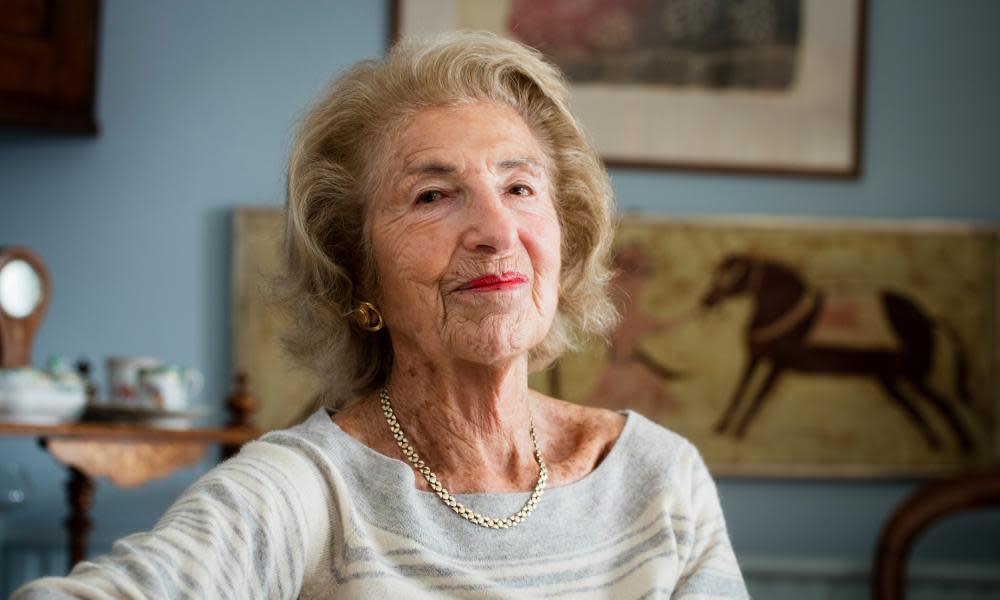Invisible Walls by Hella Pick review – from Cold War to Brexit Britain

It’s 1979, and Hella Pick is reporting a mass given by Pope John Paul II at Auschwitz. The altar has been set up on the railway platform from where victims of the Nazis were taken to the gas chambers; journalists are seated along what had been the railway line that brought the cattle trucks of Jews. “The phones we used to send our stories had been set up in the concentration camp’s watchtower,” she writes in her memoir. “I was numb with grief, with sorrow – and with anger. It was sacrilege.” The story goes to the heart of Pick’s conflicting sense of self: as a British journalist, a secular Jew, an Austrian, a refugee from the Holocaust. “I felt, probably unjustly, that the Pope had confected this into a Roman Catholic occasion and resented that few of the survivors invited to the ceremony were Jewish.”
It is the only time in Invisible Walls that Pick shows anger. The phrase “probably unjustly” demonstrates the restraint that defined her journalism over more than three decades at the Guardian. She worked stints in Washington and eastern Europe, and at the UN, among shorter assignments, ending up based in London as diplomatic editor. She coolly analysed the utterances and actions of world leaders, making sense of the 20th century for a generation of readers. She never let her emotions intrude.
Now aged 92, Pick’s life embodies the turbulence of the age. Arriving in the UK on the Kindertransport from Austria in 1939, aged 11, she grew up in a strangely peaceful Lake District, shielded from the war ravaging Europe. As a journalist, she covered the end of empire in Africa, the cold war, the 1968 upheavals in Paris, Kennedy’s assassination and the collapse of the Soviet bloc. At the UN, or at the Royal Institute for International Affairs in London she cut a distinctive figure, always elegantly dressed, her dark hair swept back from her strong features. Her deep voice with its cut-glass accent was instantly recognisable when she was interviewed on BBC radio. Those of us who followed her as female foreign correspondents in what was then a male-dominated profession could only envy her poise – and her legendary contacts book. She knew everyone, from diplomats to prime ministers and presidents. More importantly, they knew her.
One of Pick’s notable friendships was with then German chancellor Willy Brandt, whom she was sent to interview about some passing trade dispute with the US. “We sat on a window seat in his sitting room and talked into the early hours of the morning – not about the political situation and transatlantic problems, but about Hitler, the Holocaust, German history, antisemitism, guilt, conscience, morality, reconciliation.” This was not “Willy Brandt the German chancellor”, she writes, but “Willy Brandt the charismatic human being”. He might equally have noted that this was not Hella Pick the famous foreign correspondent, but Hella Pick the woman who was unlucky in love, the British citizen trying to figure out the difference between being an outsider and a foreigner.
At times reading this memoir feels like travelling on a high-speed train – no sooner have we stopped at one place than we’re hurtling on to the next. That reflects the nature of life on a daily newspaper, but it might have been easier for the reader had she omitted some episodes and gone into more depth on others. Accounts of long ago summits and UN meetings feel like yesterday’s news. Some anecdotes, however, remain fresh. Pick spent her early years getting to know west Africa’s post-independence leaders – although not as well as several might have liked. And she once tripped over and fell, literally, into the arms of President Kennedy. In Washington, she was frequently mistaken for Henry Kissinger’s wife. On one occasion after her plane, which was also carrying President Nixon, nearly crashed on the way to Minsk, an absent-minded subeditor bylined her Hella Pinsk.
Despite her professional achievements, Pick suffered from multiple insecurities, the eponymous “invisible walls” that curtailed the psychological freedom she craved. This was partly the result of an overbearing mother, Hanna, who managed to escape Austria and joined her in the UK. She could not let go, insisting on moving with Pick when she went to university, and again when she got her first job, and she later persistently called her editor. Yet how can we blame a woman who lost her own mother in the Holocaust? When Hanna came to the UK as a refugee and a single parent, the only child she had followed was all she had. No wonder they both struggled to cut the cord.
Over time, Pick learned to cherish her British, Jewish and Austrian identities. She reported Britain’s accession to the European Economic Community in the 1970s. “Memories can be so short,” she observes. “Even I, who covered them, had forgotten just how eager Britain’s politicians were to belong to the club.” A European “by instinct, as well as in heart and mind”, she describes the EU as the “framework to my uprooted life”. Nowadays, Pick feels “out of place” in Brexit Britain, let down by the land that took her in as a little girl, and whose politicians’ antics seem ever more distant from the serious, careful diplomacy on which she reported throughout her rich and successful career.
• Lindsey Hilsum’s In Extremis; the Life of War Correspondent Marie Colvin is published by Chatto. Invisible Walls by Hella Pick is published by W&N (£20). To order a copy go to guardianbookshop.com. Delivery charges may apply.

 Yahoo Movies
Yahoo Movies 
